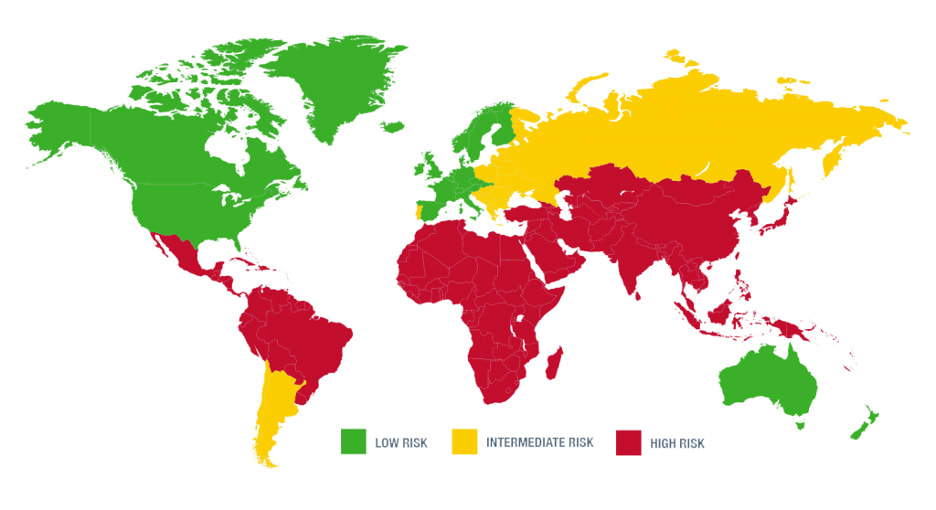Table of Contents
I. What is Traveler’s Diarrhea?
II. Prevention Strategies for Traveler's Diarrhea
III. Be Proactive for Your Next Trip
International travel brings excitement and adventure, but it can also carry an unwelcome companion: traveler’s diarrhea. This common yet disruptive condition affects countless travelers each year, turning dream vacations into uncomfortable experiences.
Fortunately, there are both preventative and treatment measures you can take to reduce your risk of contracting traveler’s diarrhea and quickly reduce symptoms if you do get it. In this article, we’ll take a deep dive into the steps you should take and medications to consider.
Quick Takeaways:
- Traveler’s diarrhea is contracted mainly by ingesting food and water contaminated with bacteria.
- Geographic regions that present the highest risk of traveler’s diarrhea are: most of Asia, the Middle East, Africa, Mexico, and Central and South America.
- Travelers can reduce the risk of contracting traveler’s diarrhea by taking careful food and water safety measures and practicing careful hygiene.
- Medications like Xifaxan are available to help prevent and treat traveler’s diarrhea symptoms.
What is Traveler’s Diarrhea?
Traveler's diarrhea is a digestive tract disorder predominantly encountered by international travelers. Its symptoms include:
- Loose or watery stools: The most prominent symptom, occurring abruptly and often urgently
- Abdominal cramps and discomfort: Ranging from mild to severe
- Bowel discomfort: Frequent, sometimes uncontrollable bowel movements
- Bloating: A feeling of fullness or swelling in the abdomen.
- Fever: Occurs in more severe cases, indicating a possible bacterial or parasitic infection
- Nausea and vomiting: In some cases, but not always present
This condition is typically caused by ingesting food or water contaminated with fecal matter. The most common culprits are enterotoxigenic Escherichia coli (ETEC) bacteria, but it can also be caused by other bacterial strains like Shigella, Salmonella, and Campylobacter, as well as certain viruses and parasites.
In many cases, the microorganisms responsible for traveler's diarrhea are part of the normal flora in the region visited, but they are foreign to the traveler's gastrointestinal system, leading to the illness.
Traveler's diarrhea is more prevalent in regions where sanitation and hygiene practices are less rigorous. High-risk areas include most of Asia, the Middle East, Africa, Mexico, and Central and South America. But while travelers to these regions are more susceptible, cases can occur anywhere in the world.

Being aware of the causes and regions where traveler's diarrhea is most prevalent is an important first step in prevention and ensuring a more comfortable travel experience.
Prevention Strategies for Traveler's Diarrhea
Preventing traveler's diarrhea primarily involves being cautious about food and water consumption. That said, there are also antibiotics for traveler’s diarrhea and other interventions for preventing and treating the condition. Below are detailed measures and tips to reduce your risk:
Food Safety
- Eat cooked foods: Opt for freshly cooked, hot foods as the cooking process helps kill bacteria.
- Avoid raw foods: Be wary of raw fruits and vegetables unless you can peel them yourself. Avoid salads and uncooked foods.
- Street food caution: While street food is a significant aspect of local culture, it can be risky. Eat from busy stalls with high turnover and better food safety practices.
- Avoid other high-risk foods: Steer clear of unpasteurized dairy products and undercooked meat or seafood.
Water Safety
- Drink bottled or purified water: Always opt for bottled water with an intact seal. Alternatively, purify tap water by boiling or using water purification tablets.
- Avoid ice: Ice may be made from contaminated water sources, so it's best avoided.
Prophylactic Medications and Vaccines
- Xifaxan (Rifaximin): Xifaxan is often recommended for prevention, particularly for short trips or for those at high risk.
- Zithromax (Azithromycin): Effective for treatment, it can also be used for prevention in areas with known bacterial resistance.
- Cipro (Ciprofloxacin): Once a go-to for traveler's diarrhea, its use is more limited now due to concerns about bacterial resistance and side effects.
- Vaccines: Currently, there are no vaccines specifically for preventing traveler's diarrhea, but vaccines for related diseases like cholera can provide some protection.
Careful Hygiene
- Handwashing: Frequent and thorough handwashing is one of the most effective ways to prevent traveler's diarrhea. Use soap and clean water, especially before eating or handling food and after using the bathroom.
- Use Hand Sanitizers: When soap and water aren't available, use an alcohol-based hand sanitizer.
- Avoid Touching Your Face: Try to keep your hands away from your mouth and face to reduce the risk of transferring harmful microbes.
- Sanitize Surfaces: In places like hotel rooms or public toilets, use disinfectant wipes on surfaces that are frequently touched.
Taking these precautions can significantly reduce the risk of traveler's diarrhea. For those at high risk or traveling to areas with a high prevalence of the condition, consulting a healthcare provider about prophylactic antibiotics may be beneficial. However, the use of these medications should be balanced against potential side effects and the risk of contributing to antibiotic resistance.
Be Proactive for Your Next Trip
Understanding, preventing, and effectively managing traveler's diarrhea are crucial steps to ensure a healthy and enjoyable journey. By recognizing the symptoms and being aware of the high-risk regions, travelers can better prepare themselves.
Adhering to strict food and water safety measures, practicing careful hygiene, and taking medications when necessary are key strategies for prevention. For those affected, knowing the treatment options, including readily available medications like Xifaxan, Zithromax, and Cipro, is essential.
Visit My Drug Center’s website to learn how you can access traveler’s diarrhea medications at the most affordable cost—and have them delivered to your front door.
The information in the article is not meant to be used for treatment or diagnosis. It is designed for general awareness and for information purposes only. Always consult a medical professional for your specific healthcare needs.
